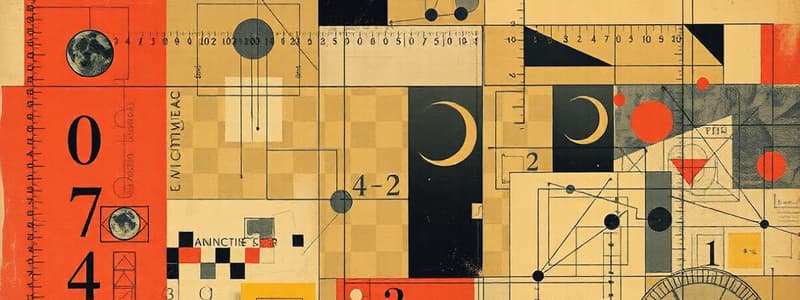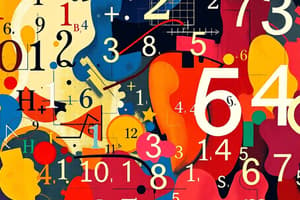Podcast
Questions and Answers
What is the primary focus of geometry?
What is the primary focus of geometry?
Which term describes the rate of change of a function?
Which term describes the rate of change of a function?
Which of the following transformations does NOT change the size of a geometric figure?
Which of the following transformations does NOT change the size of a geometric figure?
What does the integral in calculus primarily determine?
What does the integral in calculus primarily determine?
Signup and view all the answers
Which system of geometry is commonly used and relies on axioms and postulates?
Which system of geometry is commonly used and relies on axioms and postulates?
Signup and view all the answers
Which number system includes both negative and positive integers?
Which number system includes both negative and positive integers?
Signup and view all the answers
What operation is defined as separating a quantity into equal parts?
What operation is defined as separating a quantity into equal parts?
Signup and view all the answers
Which of the following correctly represents a polynomial?
Which of the following correctly represents a polynomial?
Signup and view all the answers
In the order of operations, which part comes first?
In the order of operations, which part comes first?
Signup and view all the answers
What type of number cannot be expressed as a fraction of two integers?
What type of number cannot be expressed as a fraction of two integers?
Signup and view all the answers
Which mathematical statement represents a condition using 'greater than' or 'less than'?
Which mathematical statement represents a condition using 'greater than' or 'less than'?
Signup and view all the answers
What is the term for numbers that can be written in the form a + bi?
What is the term for numbers that can be written in the form a + bi?
Signup and view all the answers
Which operation repeatedly adds a specific quantity?
Which operation repeatedly adds a specific quantity?
Signup and view all the answers
Study Notes
Fundamental Concepts
- Mathematics is a system of logic and reasoning used to quantify and understand the world around us.
- It encompasses various branches, including arithmetic, algebra, geometry, calculus, and more.
- Fundamental operations like addition, subtraction, multiplication, and division form the basis for more complex mathematical concepts.
- Mathematical notation and symbols are crucial for representing and communicating mathematical ideas clearly and concisely.
- Precise language and definitions are essential for clarity and avoiding ambiguity in mathematical arguments.
- Problem-solving is a key skill in mathematics, requiring critical thinking, logical deduction, and the application of learned concepts.
- Accuracy and detail are paramount in mathematical computations and proofs.
- Mathematical concepts are interconnected and build upon one another, forming a structured body of knowledge.
Number Systems
- Natural numbers (ℕ) are the counting numbers (1, 2, 3,...).
- Whole numbers (W) include zero and the natural numbers (0, 1, 2, 3,...).
- Integers (ℤ) include the whole numbers and their negative counterparts (..., -3, -2, -1, 0, 1, 2, 3,...).
- Rational numbers (ℚ) are numbers that can be expressed as a fraction p/q, where p and q are integers, and q ≠ 0.
- Irrational numbers are numbers that cannot be expressed as a fraction of two integers.
- Real numbers (ℝ) encompass both rational and irrational numbers.
- Imaginary numbers are numbers involving the square root of -1 (denoted as 'i').
- Complex numbers (ℂ) combine real and imaginary numbers in the form a + bi.
Arithmetic Operations
- Addition combines quantities.
- Subtraction finds the difference between quantities.
- Multiplication repeatedly adds a quantity.
- Division separates a quantity into equal parts.
- Order of operations (PEMDAS/BODMAS) dictates the sequence for evaluating expressions: Parentheses/Brackets, Exponents/Orders, Multiplication and Division (left to right), Addition and Subtraction (left to right).
Algebra
- Algebra uses variables (symbols like x, y, z) to represent unknown quantities.
- Equations express relationships between variables.
- Solving equations involves finding values for variables that satisfy the equation.
- Inequalities represent conditions where one quantity is greater than, less than, or equal to another.
- Polynomials are algebraic expressions involving variables and coefficients.
- Factoring is the process of rewriting an expression as a product of simpler expressions.
Geometry
- Geometry studies shapes, sizes, and their properties.
- Basic shapes include points, lines, angles, triangles, quadrilaterals, and circles.
- Geometric theorems provide established relationships between geometric figures.
- Euclidean geometry, the common system of geometry, relies on axioms and postulates.
- Coordinate geometry uses coordinates to define points and shapes in a plane or space.
- Transformations like translation, rotation, reflection, and dilation change the position or size of figures.
Calculus
- Calculus deals with change and motion.
- Derivatives measure the rate of change of a function.
- Integrals find the accumulation of a quantity over a range.
- Limits describe the behavior of a function as its input approaches a certain value.
- Applications of calculus include finding maximum or minimum values, calculating areas and volumes, and modeling physical phenomena.
Studying That Suits You
Use AI to generate personalized quizzes and flashcards to suit your learning preferences.
Description
Explore the foundational principles of mathematics, including essential operations, number systems, and the importance of clear mathematical communication. This quiz covers various branches such as arithmetic, algebra, and geometry, emphasizing critical thinking and problem-solving skills. Test your understanding of how these concepts interconnect and form a structured body of knowledge.




